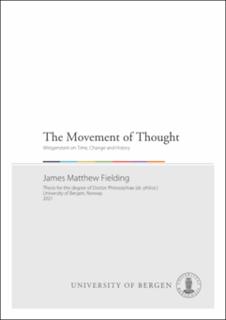| dc.description.abstract | The Austrio-British philosopher Ludwig Wittgenstein is famous among the public (philosophical and non-philosophical alike) for having written not only one, but two magnum opera―the Tractatus Logico-Philosophicus (1921) and Philosophical Investigations (1952)―with the second serving more or less as a complete repudiation of the first. Today, however, scholars recognize that far from having two distinct phases of thought, his later work actually represents a continuous process of development, reflection upon and refinement of the ideas he first explored in the trenches of World War I, rather than a straightforward repudiation. This dissertation is an investigation into an under-acknowledged element in Wittgenstein’s thought, one which in many cases acted as an impetus for that life-long process of novel philosophical reflection: History. What we witness here above all is the development of a philosophically relevant, historically conditioned form of cultural criticism throughout Wittgenstein’s philosophy of language, as well as an acute reflection concerning the timeliness of the undertaking itself. This casts a new light on the manner in which the Investigations serves as a response to the ideas first put forth in the Tractatus and, moreover, the manner in which he himself conceived of its philosophical significance.
As the topic history is (to quote a well-known scholar) ‘neither obvious nor popular’ within Wittgenstein scholarship, the role that it played in Wittgenstein’s thought is explored here from multiple angles, both chronologically and thematically. Part I traces the evolution of Wittgenstein’s thoughts on time and temporality from the Tractatus, through the Investigations, into some key post-Investigations remarks. These are Chapters One, Two and Three respectively. Part II examines the motivations behind Wittgenstein’s post-Tractarian return to philosophy and, in particular, the unique methodology he developed in order to serve his renewed purpose. Chapter Four explores Wittgenstein’s adaptation of Goethe’s conception of morphology, highlighting how the questions of temporality that are in fact inherent to the methodology itself were for both initially suppressed and only later came to occupy a key role in their respective uses of it. This helps, principally, to contextualize those remarks which may appear at times to suggest that history was unimportant for Wittgenstein’s philosophical project. Chapter Five addresses what has come to be called the ‘conservative charge’, regarding Wittgenstein’s political orientation. Through a review of some of the major discussants in this debate, I show that wherever one sits on the matter of Wittgenstein’s political convictions and its expression in his philosophy will ultimately depend upon how one understands Wittgenstein’s thoughts about tradition, change and the nature of historical continuity. Finally, Chapter Six seeks to answer the basic question which, in a certain sense, motivated this research from the outset: What was Wittgenstein trying to achieve with Philosophical Investigations? Through a historicization of the work itself, I argue that it is no longer possible today to repeat Wittgenstein’s critical agenda in any kind of straightforward way because of the manner in which the work is tied to its own historical particularities. Given that, the question becomes: What does it mean to philosophize in a Wittgensteinian spirit today, now that the times have moved on and the problems that we confront are our own? This, I conclude, is the question he wished above all for us, the philosophers of the future, to pose ourselves in order to break free of the dogmatic pictures that hold our thoughts ‘captive’ and forbid them from moving forward in other, more profitable directions. | en_US |
